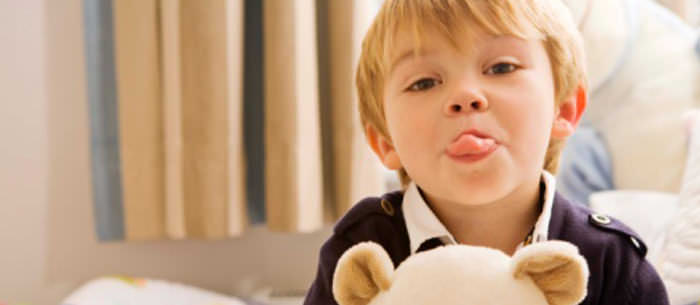After dinner at a friend’s house, you quietly instruct your 5-year-old to thank your host for a nice time. Without blinking an eye, your normally polite child crosses their arms, looks you straight in the eye and says, “No.”
Now what?
In an ideal world, you have an established family system of expectations and rules you can refer to so your child miraculously follows the proper etiquette. But many families don’t always have a cut-and-dried parenting style when it comes to polite behaviour. Even if you did, you might be stumped about how to proceed without making a scene and ruining the night.
Here is some of our advice on how to tame behaviour when your child is rude.
Have a Script
Hindsight is a wonderful thing. We constantly find ourselves wishing we could have said something differently. So, make sure you stop regretting and plan a standard line to feed your children if they act up. This will show them that you have control of the situation.
You could lean down and say, “You do understand that not saying thank you is not appropriate, and if you do not say thank you there will be consequences. If you do not say thank you, here is what will happen when we get home: …” Then tell them which privileges will be taken away.
Stay Calm
The principle of staying calm is much easier said than done, particularly in the heat of the moment. However keeping your cool is one of the most important things to do: It helps prevent the confrontational situation from escalating further, asserts your authority and sets an example to your child about how to handle yourself during disagreements.
If your child won’t comply, calmly and emotionlessly escort them out of the room and state your expectations plainly and simply. Show them that this is not something you’re going to argue about. Keep the consequences serious enough, but fair.
Follow these Tips for Staying Calm
Remember You’re Not Alone
Take a deep breath and realise that the behaviour, though maddening, is normal. Children want to know what their limits are and whether they can push the established boundaries.
Set the Family Rules – Tomorrow
The next day, when tempers have cooled down, it is a good idea to have a family discussion about expectations and limits. Families need to decide on the rules, rewards and consequences of breaking the rules. If you find yourself confronted by a similar situation again, when your child is rude and clearly flaunting the family rules, you can calmly implement the agreed upon consequences.
Reinforce Positive Behaviour
When this episode is done, let it go and don’t dwell on it. Parents can build good behaviour by focusing on the positive and being flexible.
Set up a Reward
A great idea to enforce positive behaviour is by implementing a reward system where children earn a ticket for good behaviour and then cash them in for something valuable to them. Negative behaviour means tickets will be taken away. Tickets can be worth a trip to the cinema, a half an hour with a parent, a one-time later bedtime or an extra television show. Keep rewards within your budget and time constraints, and distribute them (and take them away) in appropriate amounts, so the child sees the process as fair and rewards as reachable. Seeing tickets collect is a powerful motivator for children to learn to keep their behaviours in check.
Even if your children know the clear limits, they’re not always going to behave perfectly. However, if they know what to expect, you’ll see that rude side less often.
